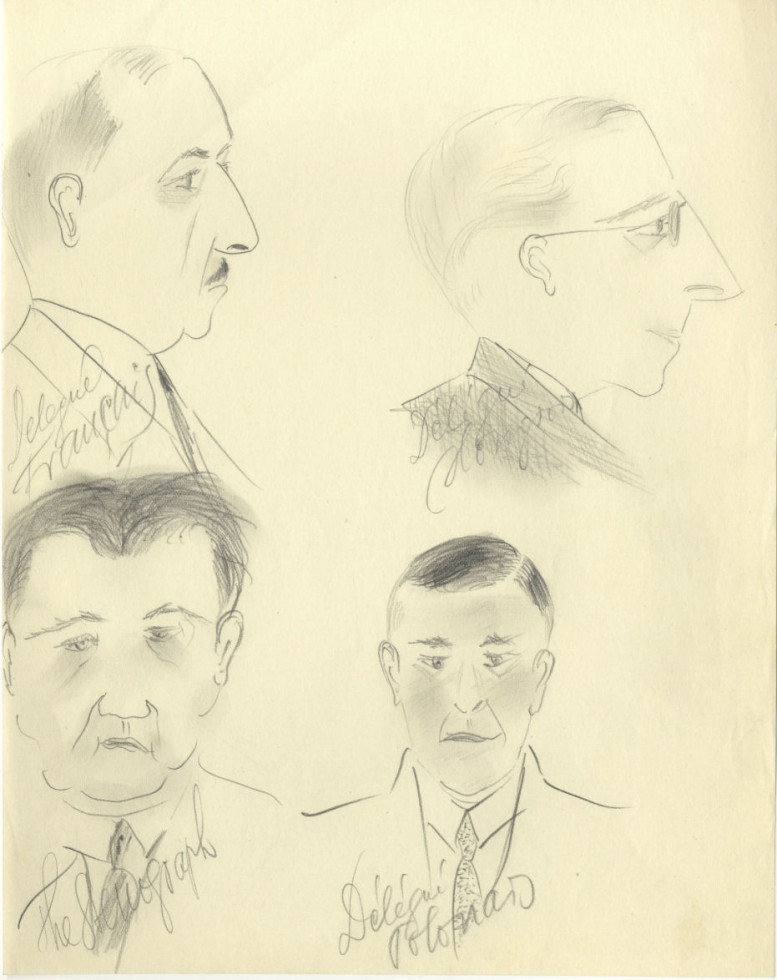Ivan Mohorič's Sketches of Participants at the International Conference

Sketches by Ivan Mohorič - participants of the international conference, sketch 1. | Author Arhiv Republike Slovenije
Ivan Mohorič was born in Idrija on May 12, 1888 and died in Ljubljana on October 4, 1980. After attending the gymnasium in Ljubljana, he studied law in Prague before landing a job with the Chamber of Commerce, Craft and Industry in Ljubljana where in 1931 he was appointed Secretary General.
In 1925, he became assistant to the Minister of Forestry and Mining, in 1926 the member of the Ljubljana Regional Parliament, and in 1930 the member of the Ljubljana City Council. In 1931, he was elected Member of the Parliament in Radovljica electoral district. Between January and June 1932 he was assistant to the Minister of Commerce and Industry and from July to November 1932 he was the Minister of Commerce and Industry in Milan Srškić’s government.
As an expert he was invited to take part in various Yugoslav and foreign business organizations and committees and was also a member of Yugoslav delegations at a number of international conferences. He wrote several papers, most of them dealing with issues in commerce, customs and traffic.
Although he offered his expertise to the newly established post-war authorities, they did not seem to like his involvement in the political structure of the former state. According to Mohorič’s complaint this was also the reason why he was taken away his right to vote. In his complaint Mohorič stated that, when issuing its decision, the electoral commission disregarded his wartime work for the Liberation Front and did not take into account the circumstances that led to his four-and-a-half-month long work as a minster. The commission also omitted the fact that Mohorič requested to retire from his work at the Chamber at the start of the war because he did not wish to serve under the occupation forces. His request was denied by the chamber’s chair on the grounds that he had yet to meet the conditions for retirement according to the company’s regulations. In his complaint, Mohorič also stated that on August 22, 1945 he was acquitted before the military court of any blame regarding his involvement in the irregularities of the Ljubljana Fair. At that trial he was asked to thoroughly explain in his defence his actions as the former minister and Member of the Parliament.
He became a research associate at the Faculty of Economics in Ljubljana and devoted himself to the study of the history of economics. He wrote a number of books on the subject, some of the most important among them were Industrialization of the Mežiška dolina Valley, The History of Industry, Forestry and Craft in Tržič I-III, The Mercury Mine in Idrija, The History of Railways in Slovenia, Two Thousand Years of Ironmaking in Gorenjska I-II, Issues and Achievements of Slovenian Mining I-II.
Documents kept by the Archives of the Republic of Slovenia as a private fonds of Ivan Mohorič are currently still being processed. Some of them apply to his work at the Chamber of Commerce, Craft and Industry and to his work at different pre-war Yugoslav ministries. Most of the documents were created during his research of the history of Slovenian economy, also preserved is some of his correspondence. The records reveal the often hidden side of Ivan Mohorič, lawyer and economist, namely his artistic flair. All sessions and meetings were not always constructive and Mohorič probably found them long and boring which is why at such times he took his pen and began to draw. Thus, among his “serious” records one can also find sketches of his contemporaries, sometimes accompanied by the author’s commentaries or by the subjects’ personal data, such as name/surname, duty, or, if the meeting was international, the state they represented. The sketches were sometimes drawn on working papers of the session or the meeting.
Presented as this month’s archivalia are some of his sketches found in a separate map among other records. The map with sketches does not include any data that would reveal the time and place of its creation or of the meeting (session, conference) during which the sketches were drawn. However, based on personal data below the sketches it is safe to assume that participants of this particular conference came from all corners of the world, as there are sketches portraying the Yugoslav minister of commerce Demetrović as well as representatives of France, Portugal, Poland, Hungary, Romania, Norway, Belgium, Finland and China.
Alenka Kačičnik Gabrič

